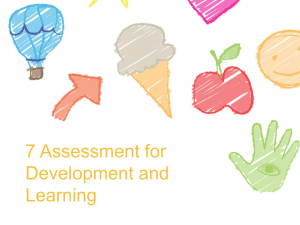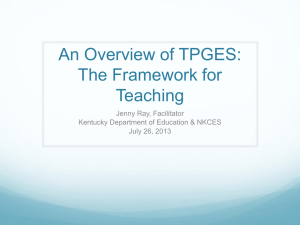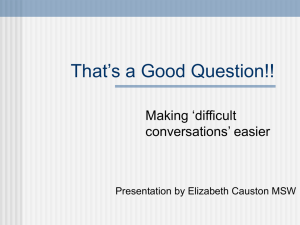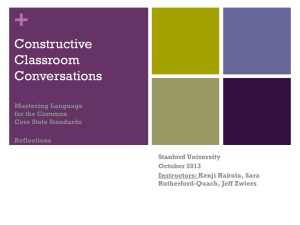Birchip P-12 School: A Mindful School guided by Powerful Learning
advertisement
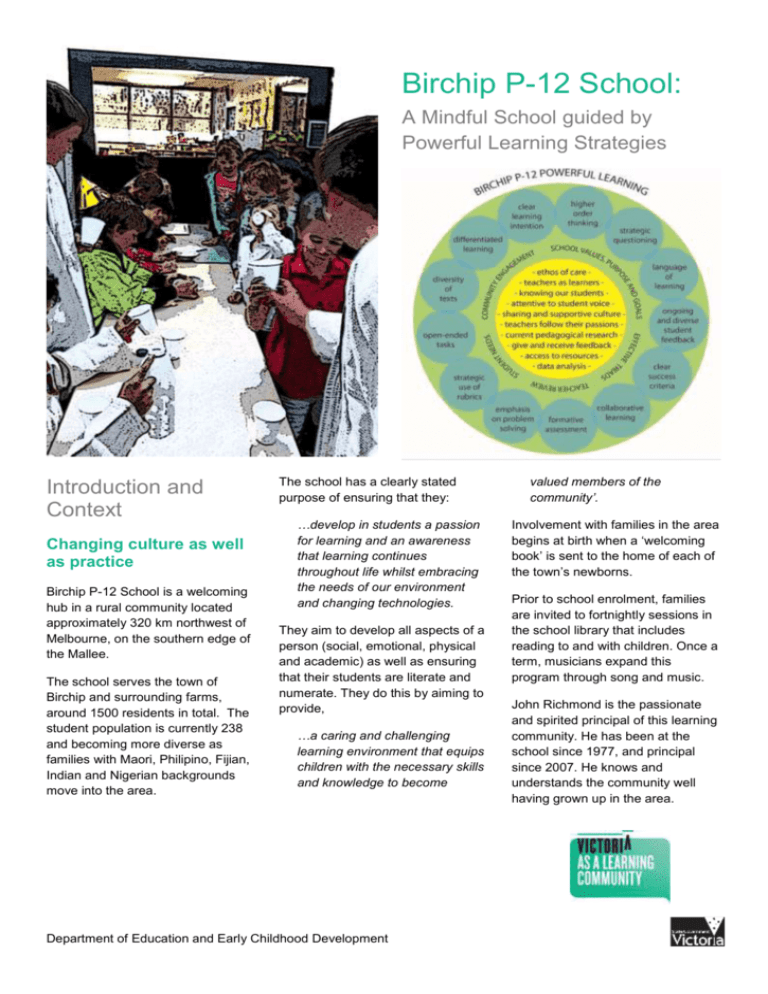
Birchip P-12 School: A Mindful School guided by Powerful Learning Strategies Introduction and Context Changing culture as well as practice Birchip P-12 School is a welcoming hub in a rural community located approximately 320 km northwest of Melbourne, on the southern edge of the Mallee. The school serves the town of Birchip and surrounding farms, around 1500 residents in total. The student population is currently 238 and becoming more diverse as families with Maori, Philipino, Fijian, Indian and Nigerian backgrounds move into the area. The school has a clearly stated purpose of ensuring that they: …develop in students a passion for learning and an awareness that learning continues throughout life whilst embracing the needs of our environment and changing technologies. They aim to develop all aspects of a person (social, emotional, physical and academic) as well as ensuring that their students are literate and numerate. They do this by aiming to provide, …a caring and challenging learning environment that equips children with the necessary skills and knowledge to become Department of Education and Early Childhood Development valued members of the community’. Involvement with families in the area begins at birth when a ‘welcoming book’ is sent to the home of each of the town’s newborns. Prior to school enrolment, families are invited to fortnightly sessions in the school library that includes reading to and with children. Once a term, musicians expand this program through song and music. John Richmond is the passionate and spirited principal of this learning community. He has been at the school since 1977, and principal since 2007. He knows and understands the community well having grown up in the area. John and his assistant principal Eileen have both been very active in and committed to researching and designing the multi-faceted, multidimensional Birchip Powerful Learning Framework. experiences. This last point is picked up by one of the students: The development of this framework has been informed by many considerations, research and publications including: Birchip teachers are proud of the positive educational environment they have created, which allows teachers, as well as students, to flourish. As one staff member describes: 1. Regional priorities, particularly the Northern Metropolitan Region’s Powerful Learning publication; 2. The DEECD e5 instructional model and associated materials; 3. Research on metacognition and higher order thinking; 4. A range of different ‘theories of learning’; 5. Thinking concepts and frameworks such as Habits of Mind; 6. Research and ideas around visible learning; 7. A perceived need for increasing problem solving and questioning skills across the curriculum. The teachers at Birchip praised their principal’s ability to ‘read’ what was presented by various consultants, the region and DEECD, and to sift out what he believed would be a good fit and ‘of benefit to students and staff’. Both John and Eileen remain active and connected to the classroom, John teaching Mathematics at various year levels and Eileen teaching English. Both maintain a robust research practice. The professional culture at Birchip P-12 is one that privileges: conversations and care; high expectations; open possibilities and challenge; respect for individuality; and, opportunities for everyone, regardless of background or life ..the teachers have our best interests at heart, and they try and get the best out of us. …if you’ve got a passion, you can follow it, and there’s a culture of everybody wanting to learn. learning and student need. They try to identify what might be the cause of challenges, suggest solutions and designate action. This forum keeps staff and leadership up to date with every student in the school and provides John with further evidence of each teacher’s engagement and perceptions. This process creates another avenue for rich conversations focused on continual improvement, accountability and active pedagogy. Collaboration is highly valued and appreciated here, and teachers want to talk about each others’ strengths and contributions. The school also has a culture of professional inquiry, with an overarching question to guide data analysis and the use of their Powerful Learning framework: …are we giving what the students need? This disarmingly simple question keeps the focus of teaching and learning on students and their learning needs at Birchip. An example of how well the school attends to this question is the establishment of Early Warning forums. These are held after school every 5 weeks and involve the whole staff as two groups – teachers of Primary and Secondary aged students. During the forums, year level leaders read out the name of every student in their care, allowing time for any member of staff to voice observations that are of concern, or particular highlights. Forum conversations focus on what each teacher is noticing about the student cohort, with contextual information such as disciplinary How did teachers learn about and engage with the model? A commitment to learn from and with everyone Central to engaging with the Powerful Learning framework has been the need for everyone involved to be reflective and to think deeply about teaching, learning and being learners. 2 Department of Education and Early Childhood Development Birchip’s use of their Powerful Learning framework is anchored in knowing and understanding the students and what they aspire to for them: …we know the students so well and we know what we want for the students. We know the areas that need attention and make careful decisions about what should be taught and when. Teachers at Birchip P-12 have ongoing access to a comprehensive and connected range of professional learning opportunities to deepen their understanding and application of the concepts and strategies within the Powerful Learning framework. Triad learning is focused by the establishment of personal and team goals, which are regularly discussed in light of progress made. The following examples of teachers’ personal goals show strong alignments with the Powerful Learning Framework: …developing more strategic and open-ended questions; making learning intentions clearer; giving students greater wait time; and ensuring students leave sessions clearer about and more conscious of what they have been learning. One of the most powerful professional learning strategies here has been participation in weekly, mixed-discipline Triads by all 28 members of the teaching staff. This is designed to promote rich, inschool collegial learning and to encourage a diversity of perspectives. Via these Triads, teachers engage in a feedback and analysis loop that informs and progresses their professional learning. This in turn promotes a culture where ongoing learning, changing, growing and developing are at the core of how adults learn at Birchip. Teachers appreciate the benefits of these triads as they ‘focus on the fact that it’s a holistic education, not distinct subjects of Maths, Science, and English...’ Merrilyn, a teacher, notes that this means, ‘we’re teaching each other all the time.’ Within the triads, individual teachers are able to draw on formally structured professional learning sessions, hands-on classroom observation strategies, self/peer engage with and apply what they’re learning about concepts and practices promoted in the framework. These include: reflection, student feedback and data analysis. - Creating a sense of shared direction and purpose with common areas of focus, which school leaders clarify, promote and support; - Keeping administrative-focused staff meetings short and sharp to allow more time for professional learning and dialogue; - Making concerted and coordinated efforts to capture and analyse evidence of learner needs and teaching impacts; - Convening ‘Early Warning’ meetings, which focus on the needs and progress of every single student every five weeks; - Negotiating individually determined professional learning goals with the principal; - Providing clear and explicit school-wide goals, with suggested strategies, and practical, visible outcomes, to guide the efforts of everyone; - Building self-organised and focused classroom peerobservations into teachers’ allotments which are then discussed during Triad meetings; - Inviting three staff members each month to present ‘Pedagogical Snippets’ or an aspect of their recent learning to colleagues and how this was successfully applied; - Learning partnerships with teachers from other schools are promoted; The 2014 School Goals also set expectations that each teacher will: Align their practices with the school's agreed Powerful Learning framework, supported by the use of focused classroom observations. Detailed school support documents provide teachers with practical and visible outcomes related to each school goal, suggest various strategies to be explored, and outline forms of evidence that would meet expectations. In addition to the Triads, a broad range of other strategies also support people to learn about, 3 Department of Education and Early Childhood Development - The principal visiting and observing classrooms every day, informally engaging with staff and students and sometimes participating in the learning; The development of the Powerful Learning Framework has ‘matured’ professional learning through classroom observation and provided a sharper focus to visits. - Providing a ten week minimum, one-on-one mentoring program to support the induction and development of all new staff; Teachers are now increasing the frequency of these observations, making a commitment to undertake five observations per term each year. These are not timetabled – the undertaking is left to each teacher’s discretion. They are also exploring new ways to enhance the observational process and noted that being filmed or filming peers ‘gives a new perspective’ to the teacher as access to a view through ‘the students’ eyes’. - - - Promoting a shared professional language, based on the framework, enabling reflection, analysis and dialogue; Engaging teachers in scaffolded self and peer assessments with an explicit focus on the desired teaching practices articulated in the framework; and, Linking with annual teacher reviews which promote evidenceinformed accountabilities tied to the Powerful Learning framework. Every teacher’s review evaluates their approach to achieving outlined goals, with specific supporting documentation expected. This includes evidence of diverse forms of student feedback being collected, analysed, and responded to, and completion of a self and peer assessment scaffold. The extensive engagement in classroom observations, grounded by the Powerful Learning framework, has also provided an evidence informed foundation for professional conversations. Such conversations are about ongoing improvement and expand and advance the next stage in each teacher’s development cycle. While the classroom observations are often completed within their triad, teachers are also encouraged to observe a diversity of classes and other discipline areas. The learning culture at Birchip is augmented by the flow of insights and beneficial feedback that results from every teacher’s ongoing and ready availability for collegial conversation. As described by one teacher: We know that everyone is willing to listen, offer an idea, be supportive. Underpinning all of this is the Birchip Powerful Learning Framework, which offers a shared professional language of powerful pedagogy and expected teaching approaches. The observation and peer-review process is well regarded by staff: We have a culture of improvement and change. We teach for the improvement of the kids. These class visits and Triads have purpose. They develop our skills in targeted ways. Teachers spoke of the persistence required to achieve their goals and break down certain barriers as they opened their classroom doors to one another: The journey has been long but very rewarding. The process of learning to take the ‘person’ out of the equation and just focus on what they saw rather than make any assumptions was hard but worth it. Now, the conversations are constructive! No-one feels threatened. The sense of collegiality, trust and understanding built throughout the year ensures that triad members are equipped to offer each other constructive feedback and respectful critical commentary. Department of Education and Early Childhood Development The shared language, enabled by the framework, has been integral to strengthening teaching and learning at Birchip. Offering this broad range of professional learning opportunities means that people are able to learn individually, in small groups and as a whole staff, thus accommodating different entry and readiness levels. Such an approach aligns strongly with research on effective professional learning and has fostered teachers’ commitment to their own learning: …we’re always expanding our thinking and seeking to enrich our context, by seeing the links between all aspects of the school. The concepts and practices promoted by the framework can now be found in use during lessons in classrooms, with and between 4 students, between teachers, during formal and informal conversations, present in most aspects of staff professional learning. How does the model inform the way teachers at the school work? Teachers as continual learners – students want to be challenged Birchip sees value in offering a breadth of subjects, which are often ‘tailor-made’ to meet the needs of the students and context. They see students: …as partners in learning and assessment, [who] need to be reflective and aware of what success looks like. A student offers their own take on learning at the school by way of a provocation: If we’re not challenged, we don’t learn. The Powerful Learning Framework continues to inform the way that teachers at Birchip: Create and use planning documents; Develop highly flexible and responsive timetables around student needs and interests; Identify learning intentions and success criteria; Design and enable ‘rich tasks’; Formulate strategies for targeted engagement; Choose what to teach explicitly; Develop and employ strategic questioning practices; Promote higher order thinking practices and skills; Prompt reflective practices in both teacher and learner; Engage in collaborative learning processes; Develop and enable effective forms of feedback; and, Develop and promote analytical strategies and skills. There is a deep commitment from teachers to expanding the ways by which every student’s learning needs are catered for and to ensuring that they have a voice in their own education. Teachers describe how students are consulted through varied means to: ‘…find out what they want. We then look at what we can offer, we consider what teachers’ allotments can be, then from there the timetable gets designed. We don’t say, ‘here’s the timetable, now pick and choose!’ We are very much student-centred in how we go about things.’ Seeking student voice through formal and informal conversations begins early in their education. A student shared: We really get to have a say! Through the Student Board and other chats with the teachers, we can tell the school what subjects we want and if we would like changes made in the grounds. We’ve come up with subjects like ‘Lifeskills’, where we learn everyday, but important, stuff like how to change a tyre, sew buttons onto a coat, simple but important, practical things. Soon we’re going to have Ancient History. Eileen, the assistant principal, emphasised that students were highly appreciative when teachers shared their passions during these new Units as their modelling of being an active and enthusiastic learner themselves had a profound effect on students’ enagement with the new Units. An example offered was a unit of work that explored the concept of ‘Flight’. A teacher with a keen interest in aeronautics structured a semester of rich-tasks and interdisciplinary learning around this concept. They combined both AusVELS requirements with their rich life experience to make the Unit more relevant and real for students. Students developed a holistic understanding of flight through Science, English, Maths, History and Physics-based investigations, looking at the history and physics of flight, hot air balloons, navigation and much more. Students also had the opportunity to go on a commercial flight and meet a light-aircraft pilot who gave them a memorable perspective of their farms and the surrounding area. A teacher described the flexible ways in which teachers work at Birchip P-12, collaborating with and supporting each other across disciplines, ‘and that’s what makes teaching at Birchip really interesting.’ This flexibility in how teachers collaborate across disciplines has had a significant impact on student learning and students’ capacity to better understand and observe interconnections. Collaborative design of Units that emerge from the ideas of staff and students ensure a dynamic design process that draws upon the expertise of staff working in a range of disciplines while also being 5 Department of Education and Early Childhood Development considerate of students, their needs and their input. The Powerful Learning Framework informs both the design and teaching approaches employed in each Unit of work. Another example offered was one where students initiated the development of a new Unit. Students expressed interest in psychology and active engagement in sports which led to the development of the ‘Improving Performance’ unit. The Psychology teacher approached the PE teacher and together they structured a new Unit that delved into the theory of sports psychology for improved performance. Teachers were then guided by students’ feedback as the course was developed and enacted, and consequently achieved a high level of student participation and collaborative learning. Using principles introduced through the unit - such as sports psychology and physical coaching - students organised and ran a basketball competition as an application of their learning. Numerous strategies from the Powerful Learning Framework are in evidence in this example. The school offers a personalised learning schedule for every student in the Year 9/10 group, which also enables differentiation. ensures a breadth of relevant, selfinitiated choices for students. A teacher explains that, …there is no set framework for the design of these elective subjects. We are a non-text-book school so it comes from a backwards design. We start at the end, looking at the key skills, knowledge and understandings we want the students to develop, and we plan backwards from there. We source a great variety of texts, we talk to each other and bring in other teachers’ expertise. It’s about being creative, listening and talking, and the shared staff room really helps with this. The methodical collection and analysis of diverse student learning data informs teachers along with the Powerful Learning Framework. class: … they cover key concepts, equipping them with skills and confidence so they are better able to keep up, so we don’t lose anyone in the learning. At the same time, teachers respond to students’ need for greater challenge, offering opportunities for extensions or enrichment tasks. For example, a small group of Year 8 students have been able to join a Year 9/10 English class where there is a strong focus on conversation and analysis of text through groupwork. As a result, these students have expanded their appreciation of diverse opinions, developed strategies for communication and problem solving, and experienced progression in learning through different stages of school. Differentiated learning opportunities are provided in a very personalised way at Birchip and teachers report immediate and long-term growth, as students progress to readily participate in everyday learning activities. One student shared their view that: As a result of the Early Warning Forums, individual students are targeted to work one-on-one with a staff member either during or before The Birchip framework both informs and is in evidence in such resources as: unit plans, rubrics and templates; student research models; …enrichment programs should be for everyone, so that everyone is always doing their best, being challenged, going further. After drafting of the schedule, students can have conversations with the coordinating teacher, Andrew, where alternative options, learning interests, and suggestions for beneficial subject inclusions are discussed. Again, this exemplifies the central principles articulated in the Powerful Learning Framework. This approach, along with the biennial cycle for elective subjects, 6 Department of Education and Early Childhood Development strategies for developing students’ open-ended questions and problem solving skills; feedback templates; and open-ended, critical thinking activities. What has been the impact of engaging with the model? More mindful practice As a result of enacting the Powerful Learning Framework, there is now greater consistency across the school, as common pedagogies, teaching strategies, scaffolds and associated tools and resources are used to progress student learning. The framework has also guided the exploration of new concepts, and supported deeper dialogue, analysis and understanding. This has created a strong sense of continuity and connectedness in the school. which can be so demoralising for students. Now I include pre and post-tests, assessment AS learning, and look at measurable growth over a period of time. Lessons are largely student driven, with investigations in which students extend past knowledge through activities involving application, analysis and observation. I’m aware of the language I use that helps students learn, and while differentiation is a work in progress, it’s improving! Teachers described how: …the focus is now on pedagogy and as a result, is a lot more productive and constructive. We can readily ask, ‘how did it go when you tried xyz…talking about pedagogy is now a norm, where in the past it was a foreign concept that we often moved away from. The development of a common language for learning has been a strategic enabler for teachers and students across the school and a significant impact of developing the Powerful Learning framework. I evaluated students’ work rather than involving them in self and peer assessments. I focused on students getting it right or wrong, not their observable growth from beginning to the end of a unit, The design of more open-ended activities with an emphasis on higher order thinking as each ‘task’ progresses means that teachers are better enabling differentiated learning opportunities at each stage of students’ learning development. Students have clearly developed a language of learning which they revealed through their reflections on what ‘good teachers’ do: Good teachers give us challenges, and gradually increase the challenges. If they go too fast or skip things, we get lost, and bored if it is too slow or repetitive. A younger student, offered her point of view: A good teacher… they help and respect you, give you support to learn, but not give you the answers. They are fun and urge you to keep trying. They listen to what you want to say, and give you time to state your reasons. A teacher of Middle and Senior school students describes how her practice has shifted and evolved: (Previously), I taught content, provided the theory and talked for the majority of the class! I wondered why students had difficulties explaining and justifying concepts. of learning through their work across different age groups. Collaborations with teachers working in different year levels have enabled them to better understand the learning trajectories of students’ development. Teachers now think about the social context of learning in addition to what is important for students to learn. They aspire to provide relevant challenges to all students and facilitate a process that ‘brings out more of the student’. Teachers also expressed a greater sense of clarity regarding the context, continuity, and progression And that’s to do with school or anything - like explain why you were late or whatever. They don’t assume things, they don’t think they know everything. A good teacher will let us do things ourselves, try different things. A good teacher gives you pathways to the answer. The Powerful Learning Framework has provided teachers with a design and reflection lens that is in use every day: 7 Department of Education and Early Childhood Development We have developed a common language, our understanding of students’ needs has changed. learning for staff, resulting in deeper learning for students. A teacher gives an example: An experienced teacher notes how her practices have developed and strengthened over time: I didn’t scaffold well enough, but now I identify ‘difficult’ tasks and teach strategies to work through these. I teach strategies for improved thinking skills. Correspondingly, a student expresses their appreciation of how: …teachers introduce new thinking all the time. They push you to go one step further and you see how many possible ways there are to do things. We are confident that the teachers will help us, so we can ask questions and it’s ok not to understand. The ethos of care, knowing students and listening to their voices continues to shape the vision, work and learning of teachers at Birchip: … We have developed our perspective of students and school, are determined to help each student develop life-skills, to be independent and capable beyond their time at Birchip. We aim for every student to be reflective and focus on what is required for success, to feel and be employable, to see the value in work, to develop a work ethic. If we are to break a ‘povertycycle’, with long term unemployment present in the community, we need to reassess our own position. Teachers described how increased role clarity and opportunities for professional conversations across the school had led to significant …last year, we all sat together and rigorously went through what we think we should teach at each level, looking at the starting point and end points, with clarity of purpose. We question ourselves and ask ‘are we giving what the kids need, are we holding any back?’ We want our kids to be thinkers, we try and get them away from the memory stuff. Students are also increasingly involved in assessment design and reflecting on the process of learning. They are positioned as partners in the learning process and teachers value being able to learn from the input and feedback that students offer. This teacher offered by way of example how Mathematics was being approached this year: We are emphasising problemsolving, higher order thinking, and embedding the language of powerful learning, while allowing for diversity of capacities and extension of capabilities. We don’t follow AusVELS to a ‘tee’, we always consider our knowledge of the kids. More rigorous collection and analysis of student data now underpin teaching and learning. Teachers reported better understanding learner needs and the impacts of specific teaching practices on student learning. Practices such as presenting clear learning intentions and success criteria to their classes, explicitly teaching targeted concepts and utilising language associated with ‘higher order thinking’ are increasingly a part of all teachers’ repertoires. School leaders have been encouraging, and are now seeing a greater inclusion of formative assessment strategies in teachers practice. This includes use of existing summative assessment strategies in a more formative way. Teachers value assessment as learning practices because they believe these better reflect their ethos of care and attention for every individual’s needs and potential: ‘…now we teach through the content, not to it, via strategies we have developed and in ways that will improve outcomes. Everything is seen in context’. What might other schools learn from the Birchip P-12 College experience? 8 Department of Education and Early Childhood Development A multi-dimensional and holistic approach to teaching and learning The team at Birchip are united in their motivation to provide the best opportunities for the students in their care, with the knowledge that strong teaching and learning outcomes are founded on a sense of wellbeing and belonging. As a champion of innovation, John, the principal, has galvanised his staff to experiment and take risks with their practice, so that they experience and see benefits in their personal and professional growth. Such encouragement and trust has led to ongoing improvements in teacher practice, enhanced student learning outcomes and stronger community participation. or judgement eases the anxiety that was initially present.’ John makes it clear that he sees these visits as a learning opportunity for everyone, where he can familiarise himself with the many and varied activities within the school, while having informal conversations with staff and students. This in turn informs his own leadership practice. While the staff readily acknowledge John’s leadership strengths, it is significant to note that he identified the careful selection of an effective team of leaders and teachers as a vital factor in Birchip’s success. Their skills and prior work experience contribute to the liveliness of the learning community, which in turn has significantly broadened the opportunities offered to students. One of the teachers noted how important the principal and his clarity and consistency of vision were to the process of engaging with, understanding and applying the ideas and strategies in the Powerful Learning Framework: When recruiting new staff, John goes to great lengths to ensure that: Daily classroom visits by the principal helped to create an open culture for learning. John has carefully observed his staff and the students’ responses to these new ways of teaching and participated in classroom activities. …nothing comes as a surprise for the interviewee. Two to three days prior to the interview, the applicant receives the questions they will be asked…We want them to present in the best possible way. ‘…no longer surprised or feel scrutinised as the positives are drawn out, and the realisation that it is not a process of criticism The school regards students’ access to a range of curriculum options that expand perspectives beyond AusVELS, as a critical factor to achieving their key goals. Having developed strategies to support such options, while maintaining a firm focus on higher order thinking, problem solving, and targeted explicit teaching, the school proudly states, Here, We think! Empowering all staff to have a voice through formal and informal structures, while continually seeking authentic and well-informed student voice, have been twin imperatives to the successful Birchip learning community. A young teacher explains, He has a strong belief, real conviction. We understood that the concepts and strategies were not just coming and going.’ A cultural shift has occurred as teachers and students are: We want to see that they are the type of person willing and interested in participating beyond ‘requirements’, someone who is willing to go out of their comfort zone and go the extra mile. We employ the person, not the teacher. Another member of the selection panel explains that: Honesty and altruism are highly valued; we enquire about the applicant’s passions and community involvement. I knew I would have the support from teaching staff at Birchip P12 having done a professional placement here and witnessing the triads and other professional learning meetings. In this tight-knit, relatively isolated town, John has also created an environment, ethos and impetus for connections to be fostered between Birchip P-12 and the broader community. Various individuals, groups, businesses and other educational establishments see great value in maintaining a link with this outwardlooking, forward-moving school. Several Birchip Alumni provide valuable sponsorship for end of year 9 Department of Education and Early Childhood Development celebrations acknowledging students’ personal and academic growth and community participation. They share the respect they have for their own experience of learning at the school. Teachers at Birchip – especially those teaching VCE – are encouraged and supported to form learning partnerships with teachers from other schools in the region. Teachers share data, moderate student work samples, and evaluate and reflect on best practice measures, as a means to progress teachers’ and students’ learning in each of the schools. In terms of his own leadership, John models the value of working collaboratively with peers. On a daily basis, he communicates with a colleague at a Secondary School, discussing ideas and concerns, offering and considering solutions, and supporting in-context innovation. John’s personal research has been critical to nurturing his own and the Birchip team’s learning. This has helped him keep up-to-date with innovative strategies and contemporary pedagogy. understanding of individual contexts and related needs, while modelling the school’s philosophy in the way he works. John ensures that all staff members have ready access to learning tools, resources, and professional learning. He also provides frequent opportunities for them to voice ideas or concerns and to act on their ideas. A student, sharing her perceptions of change at the school, picked up on what this philosophy and the Powerful Learning Framework mean in action: With recent changes to the local community as a result of new arrivals from overseas, the Birchip team see a need to be nimble and responsive. They are active in equipping themselves with new learning and strategies in order to support any student that joins their community. John’s foundational principle of care is evident in the ways he communicates. Whether he is lightheartedly - yet persuasively reminding students of school expectations or offering an attentive ear when they share their personal concerns, he demonstrates his Teachers here are organised and obviously communicate with each other across year levels and subjects, because it’s unusual that we repeat things. This also helps the teachers understand us as students, and how we like to learn best. We can see that the teachers are making changes to how they teach, more with what works for us, like they are really trying to get more discussion happening. We know we have a role to play, and we should contribute to class when the teacher asks for our opinions, because they really care.’ 10 Department of Education and Early Childhood Development

